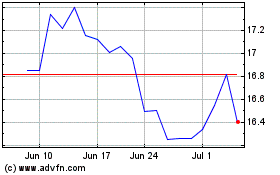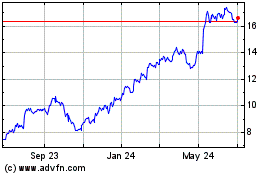By Brent Kendall and Jared S. Hopkins
WASHINGTON -- The U.S. business of Teva Pharmaceutical
Industries Ltd. was indicted Tuesday on charges the generic
drugmaker fixed prices on cholesterol medication and other
drugs.
The Justice Department's antitrust division brought the case in
a Pennsylvania federal court, alleging Teva Pharmaceuticals USA
engaged in anticompetitive conduct that resulted in at least $350
million in overcharges to consumers.
Prosecutors accused the company of fixing prices, rigging bids
and allocating customers in three different conspiracies, including
for pravastatin, a commonly prescribed cholesterol drug, whose
brand name is Pravachol. A second conspiracy involved price fixing
on medications used to treat arthritis, seizures, pain, skin
conditions, and blood clots, the Justice Department alleged. The
third alleged conspiracy involved drugs used to treat brain cancer,
cystic fibrosis, arthritis, and hypertension, the department
said.
Teva participated in the conspiracies from May 2013 until at
least December 2015, prosecutors alleged.
"Today's charge reaffirms that no company is too big to be
prosecuted for its role in conspiracies that led to substantially
higher prices for generic drugs relied on by millions of
Americans," Assistant Attorney General Makan Delrahim, the Justice
Department's top antitrust official, said in a statement.
A Teva spokeswoman declined to comment.
The indictment is the highest-profile action in a long-running
investigation that has swept across the generic-drug industry and
has resulted in cases against seven companies and four executives
so far.
Generic drugs account for some 90% of medications dispensed in
the U.S. The lower-priced medications serve to rein in drug costs.
When a branded company loses its government-granted period of
exclusivity, generic drugs can be greenlighted by regulators for
companies to market them, creating competition and bringing prices
down.
Most companies so far have agreed to settle charges by paying
criminal penalties, admitting wrongdoing and agreeing to cooperate,
in exchange for deferred prosecution agreements in which the
government would drop the cases eventually, so long as the
defendant companies fulfilled their obligations under the
settlements.
Among those that reached such deals were Novartis AG's Sandoz
subsidiary, which in March agreed to pay a $195 million criminal
penalty, and Taro Pharmaceuticals Inc., which agreed last month to
pay $205.7 million.
The department alleged Teva's conspirators included Sandoz and
Taro, as well as Apotex, which agreed to pay a $24.1 million
penalty in May, and Glenmark Pharmaceuticals, which is facing
charges the Justice Department announced in June. The company has
pleaded not guilty.
Teva had met with top DOJ brass to try to persuade them not to
bring a case, and it was resistant to a settlement that would have
included a deferred prosecution agreement and a requirement that
the company admit wrongdoing, according to the person familiar with
the matter.
Teva, which had nearly $17 billion in sales last year, is among
the largest pharmaceutical companies by revenue globally. The
company has been challenged in recent years by the collapse of
generic drug prices and a heavy debt load, seeing shares fall more
than 80% since 2015. New management initiated a restructuring.
In addition to financial penalties, a felony conviction of Teva
could lead to its exclusion from federal health-care programs.
The case would mark a rare showdown in court. Because the stakes
of a criminal conviction can be so dire, companies in the Justice
Department's crosshairs for price fixing rarely elect to go to
trial, especially because prosecutors usually have other companies
cooperating with their cases.
Each of the charges carries a statutory maximum penalty of $100
million, but the maximum fine may be increased to twice the gain
derived from the alleged crime or twice the loss suffered by
victims.
The charges are the latest headache for Teva, which also is
facing price-fixing lawsuits from state attorneys general and
private plaintiffs, including health insurers.
A coalition of states have filed three sweeping lawsuits related
to drug price-fixing since 2016 against a host of companies
including Teva. The most recent, filed in June, involves alleged
price-fixing of more than 80 prescription drugs including skin
medications.
The states have alleged that conspiracies among top generics
makers played out over years at routine industry events, including
meals, parties and golf outings as well as telephone calls, emails
and text messages.
Teva has disputed the allegations.
The company's U.S. unit also was hit with a separate civil
lawsuit from the Justice Department earlier this month alleging it
engaged in a scheme to game the Medicare system and prop up high
prices for its multiple sclerosis drug Copaxone. Teva denied the
allegations.
Teva is also among drug manufacturers facing thousands of
lawsuits brought by states, cities and counties accusing it of
helping spark the nation's opioid crisis. Last year Teva agreed to
a global settlement framework with several state attorneys general
to resolve the claims, but so far nothing final has been
announced.
Chief Executive Kare Schultz said in an interview earlier this
month he had hoped a deal would go through earlier this year, and
that talks are continuing.
Write to Brent Kendall at brent.kendall@wsj.com and Jared S.
Hopkins at jared.hopkins@wsj.com
(END) Dow Jones Newswires
August 25, 2020 20:28 ET (00:28 GMT)
Copyright (c) 2020 Dow Jones & Company, Inc.
Teva Pharmaceutical Indu... (NYSE:TEVA)
Historical Stock Chart
From Mar 2024 to Apr 2024

Teva Pharmaceutical Indu... (NYSE:TEVA)
Historical Stock Chart
From Apr 2023 to Apr 2024
